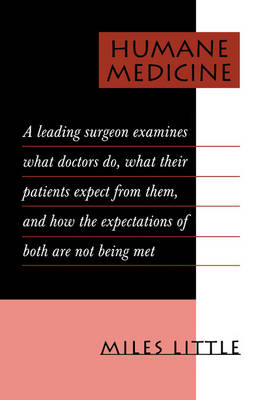
Humane Medicine
Seiten
1995
Cambridge University Press (Verlag)
978-0-521-49863-0 (ISBN)
Cambridge University Press (Verlag)
978-0-521-49863-0 (ISBN)
This 1995 book examines what doctors do, and what patients expect them to do. It finds that in the face of uncertainty, expectation and reality often diverge. Starting from the communication difficulties between doctors, and patients, Humane Medicine explores the roles of science, ethics and the humanities in medical practice.
Despite its impressive achievements, modern medicine still seems to have failed to satisfy public expectations. Government regulation of hospitals and doctors is tightening in most Western countries. Health funding is a divisive political issue. In the United States especially, medical litigation has reached alarming levels. Is there something wrong with medical research and practice? This 1995 book examines what doctors do, and what patients expect them to do. It finds that in the face of uncertainty, expectation and reality often diverge. Starting from the communication difficulties that exist between doctors and patients, Humane Medicine explores the roles of science, ethics and the humanities in medical practice. It argues that more science cannot heal this rift, nor can better education in ethics. To foster better communication, medical teachers must ensure that value-laden issues in clinical medicine are interwoven with the necessary science. Professor Little outlines some possible ways to achieve this.
Despite its impressive achievements, modern medicine still seems to have failed to satisfy public expectations. Government regulation of hospitals and doctors is tightening in most Western countries. Health funding is a divisive political issue. In the United States especially, medical litigation has reached alarming levels. Is there something wrong with medical research and practice? This 1995 book examines what doctors do, and what patients expect them to do. It finds that in the face of uncertainty, expectation and reality often diverge. Starting from the communication difficulties that exist between doctors and patients, Humane Medicine explores the roles of science, ethics and the humanities in medical practice. It argues that more science cannot heal this rift, nor can better education in ethics. To foster better communication, medical teachers must ensure that value-laden issues in clinical medicine are interwoven with the necessary science. Professor Little outlines some possible ways to achieve this.
1. Confronting the present: confronting the future; 2. The clinical process: a Popperean analysis; 3. Science and the epistemology of clinical medicine; 4. The impact of authority and medical research; 5. Probability: master or servant; 6. Autonomy and a calculus; 7. Ethics and the definition of professionalism; 8. The bioethics committee; 9. Autonomy, logic, hermeneutics and informed consent; 10. Text, context and the medical history; 11. Towards a new medicine; 12. A summary.
| Erscheint lt. Verlag | 28.7.1995 |
|---|---|
| Zusatzinfo | Worked examples or Exercises |
| Verlagsort | Cambridge |
| Sprache | englisch |
| Maße | 140 x 216 mm |
| Gewicht | 270 g |
| Themenwelt | Medizin / Pharmazie ► Medizinische Fachgebiete ► Medizinethik |
| Studium ► Querschnittsbereiche ► Geschichte / Ethik der Medizin | |
| ISBN-10 | 0-521-49863-5 / 0521498635 |
| ISBN-13 | 978-0-521-49863-0 / 9780521498630 |
| Zustand | Neuware |
| Informationen gemäß Produktsicherheitsverordnung (GPSR) | |
| Haben Sie eine Frage zum Produkt? |
Mehr entdecken
aus dem Bereich
aus dem Bereich
Die Geschichte eines Weltzentrums der Medizin von 1710 bis zur …
Buch | Softcover (2021)
Lehmanns Media (Verlag)
CHF 27,90
von der Antike bis zur Gegenwart
Buch | Softcover (2024)
C.H.Beck (Verlag)
CHF 16,80
Krankheitslehren, Irrwege, Behandlungsformen
Buch | Softcover (2024)
C.H.Beck (Verlag)
CHF 55,90


